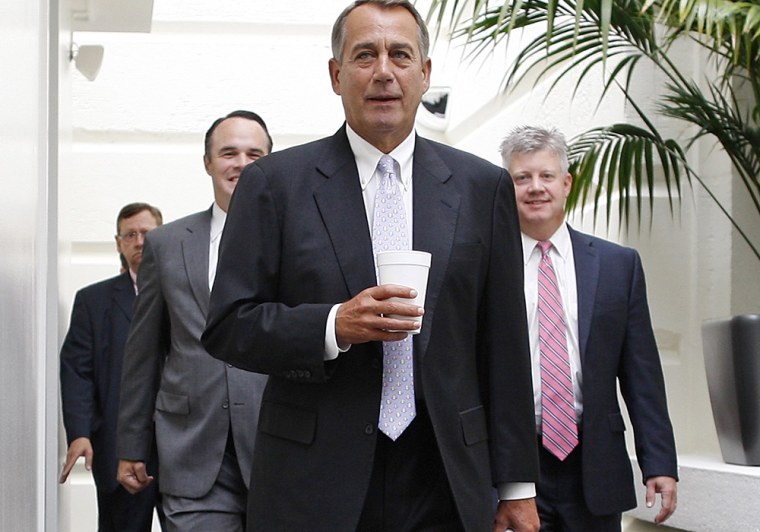
A government shutdown is more likely after House Republicans voted late Saturday to fund the government and delay "Obamacare" for a year, upping the ante in their fiscal showdown with President Barack Obama.
In spite of a veto threat from Obama, Republicans led by House Speaker John Boehner, R-Ohio, doubled down on their strategy of using the specter of a government shutdown to extract concessions from the president on the Affordable Care Act, the president's signature domestic achievement.
The House voted largely on party lines to fund the government through Dec. 15, but attached to that measure were amendments to delay Obamacare for a year and repeal a politically unpopular tax on medical devices. Specifically, the House voted 231 to 192 on a measure to continue government funding and to delay the health care law for a year.
“The House has again passed a plan that reflects the American people’s desire to keep government running and stop the president’s health care law," Boehner said in a statement. "Now that the House has again acted, it’s up to the Senate to pass this bill without delay to stop a government shutdown. Let’s get this done.”
As a way to politically inoculate themselves against the political fallout from a shutdown, Republicans also passed separate legislation to guarantee military members' pay should a shutdown come to pass.
Still, the votes only seemed to increase the odds of a shutdown come the end of Monday as Democrats in the Senate vowed to reject the House bill before it had even passed.
"Today’s vote by House Republicans is pointless," Senate Majority Leader Harry Reid, D-Nev., said in a statement. "To be absolutely clear, the Senate will reject both the one-year delay of the Affordable Care Act and the repeal of the medical device tax."
To boot, the White House promised a veto should the legislation ever reach Obama's desk. "Any member of the Republican Party who votes for this bill is voting for a shutdown," said press secretary Jay Carney.
Republicans nonetheless barreled ahead with the strategy, suggesting their desire to mollify the party's core, conservative supporters, who regard Obamacare with outright hostility. Opposition to the Affordable Care Act has become central to the modern GOP's identity; the party has tried 40-some times to repeal the law, knowing full well that such legislation would die in the Senate.
Saturday evening's vote, though, represented an attempt by Republicans to shift the political pressure back to Reid, Senate Democrats and Obama. With two business days remaining before the shutdown deadline, the Senate wasn't set to convene on Sunday. Senators were next scheduled to meet on Monday, the day when current government spending is set to expire.
As the posturing played out, a shutdown seemed more likely than ever. Though Obama had been able to avert a shutdown in past showdowns with Republicans, there were no active negotiations between the president and his Republican adversaries. Obama spent Saturday playing golf, as Republicans spent the afternoon at work on Capitol Hill.
A shutdown would have broad economic ramifications, but serious political fallout as well. During a similar impasse in 2011, both Obama and Republicans in Congress saw their approval ratings tumble. Heading into this spending fight, most polls have suggested voters would be slightly more inclined to blame Republicans for a shutdown than Obama or congressional Democrats.
The weekend's escapades marked the end to a politically dramatic week in Washington, which saw the Senate eventually approve a "clean" extension of government spending through Nov. 15 — only after a 21-hour talk-a-thon waged against Obamacare by Sen. Ted Cruz, R-Texas.
That debate split Senate Republicans, who openly questioned the wisdom of using the threat of a shutdown to achieve the unlikely goal of defunding Obamacare. By comparison, the Republicans in the House on Saturday displayed remarkable unity — a somewhat unusual display, given the occasional internal divisions that have split the House GOP in the past.
The latest gambit by Boehner, in fact, generated a great deal of enthusiasm among rank-and-file Republicans. "I said, like 9/11, 'Let's roll!'" Rep. John Culberson, R-Texas, told msnbc.com after a meeting of GOP lawmakers, referencing the rallying cry for passengers on Flight 93 who fought to retake the plane on Sept. 11, 2001.
NBC News' Luke Russert and Kristen Welker contributed reporting.